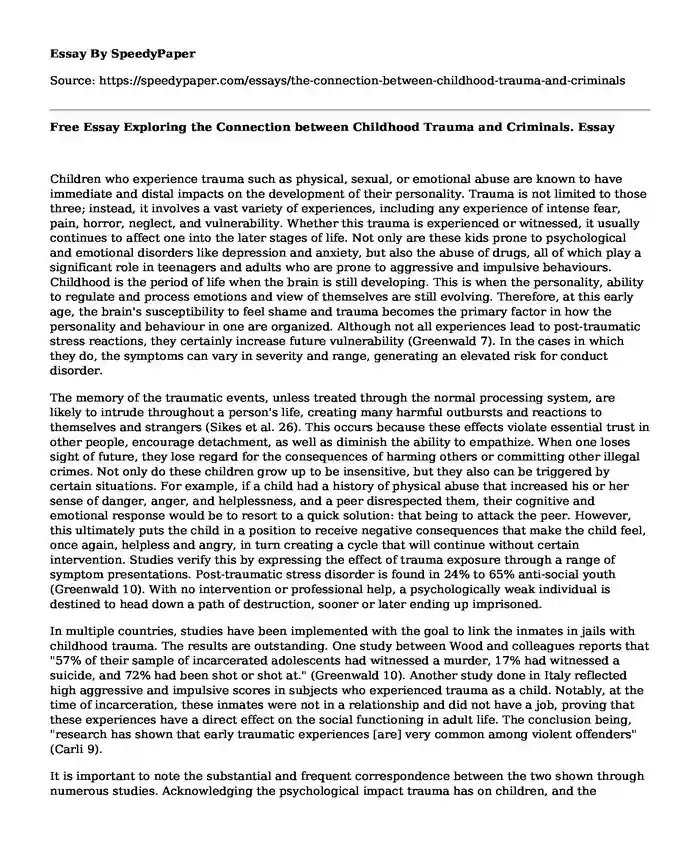
| Type of paper: | Research paper |
| Categories: | Child abuse |
| Pages: | 3 |
| Wordcount: | 702 words |
Children who experience trauma such as physical, sexual, or emotional abuse are known to have immediate and distal impacts on the development of their personality. Trauma is not limited to those three; instead, it involves a vast variety of experiences, including any experience of intense fear, pain, horror, neglect, and vulnerability. Whether this trauma is experienced or witnessed, it usually continues to affect one into the later stages of life. Not only are these kids prone to psychological and emotional disorders like depression and anxiety, but also the abuse of drugs, all of which play a significant role in teenagers and adults who are prone to aggressive and impulsive behaviours. Childhood is the period of life when the brain is still developing. This is when the personality, ability to regulate and process emotions and view of themselves are still evolving. Therefore, at this early age, the brain's susceptibility to feel shame and trauma becomes the primary factor in how the personality and behaviour in one are organized. Although not all experiences lead to post-traumatic stress reactions, they certainly increase future vulnerability (Greenwald 7). In the cases in which they do, the symptoms can vary in severity and range, generating an elevated risk for conduct disorder.
The memory of the traumatic events, unless treated through the normal processing system, are likely to intrude throughout a person's life, creating many harmful outbursts and reactions to themselves and strangers (Sikes et al. 26). This occurs because these effects violate essential trust in other people, encourage detachment, as well as diminish the ability to empathize. When one loses sight of future, they lose regard for the consequences of harming others or committing other illegal crimes. Not only do these children grow up to be insensitive, but they also can be triggered by certain situations. For example, if a child had a history of physical abuse that increased his or her sense of danger, anger, and helplessness, and a peer disrespected them, their cognitive and emotional response would be to resort to a quick solution: that being to attack the peer. However, this ultimately puts the child in a position to receive negative consequences that make the child feel, once again, helpless and angry, in turn creating a cycle that will continue without certain intervention. Studies verify this by expressing the effect of trauma exposure through a range of symptom presentations. Post-traumatic stress disorder is found in 24% to 65% anti-social youth (Greenwald 10). With no intervention or professional help, a psychologically weak individual is destined to head down a path of destruction, sooner or later ending up imprisoned.
In multiple countries, studies have been implemented with the goal to link the inmates in jails with childhood trauma. The results are outstanding. One study between Wood and colleagues reports that "57% of their sample of incarcerated adolescents had witnessed a murder, 17% had witnessed a suicide, and 72% had been shot or shot at." (Greenwald 10). Another study done in Italy reflected high aggressive and impulsive scores in subjects who experienced trauma as a child. Notably, at the time of incarceration, these inmates were not in a relationship and did not have a job, proving that these experiences have a direct effect on the social functioning in adult life. The conclusion being, "research has shown that early traumatic experiences [are] very common among violent offenders" (Carli 9).
It is important to note the substantial and frequent correspondence between the two shown through numerous studies. Acknowledging the psychological impact trauma has on children, and the outcomes can lead to a larger focus on prevention. More than half of the inmates all over the world may have chosen different lifestyles and made better decisions if the trauma were avoided or properly processed and dealt with at an early age. Intervening can improve the quality of new generations' lives and lower the rate of criminal activity significantly.
Works Cited.
Carli, Vladimir, et al. "Trait-Aggressiveness and Impulsivity: Role of Psychological Resilience and Childhood Trauma in a Sample of Male Prisoners." Nordic Journal of Psychiatry, vol. 68, no. 1, Jan. 2014, pp. 8-17.
Greenwald, Ricky. Trauma and Juvenile Delinquency: Theory, Research, and Interventions. Routledge, 2014.
Sikes, April, and Danica G. Hays. "The developmental impact of child abuse on adulthood: implications for counselors." Adultspan Journal 9.1 (2010): 26-35.
Cite this page
Free Essay Exploring the Connection between Childhood Trauma and Criminals.. (2022, May 19). Retrieved from https://speedypaper.net/essays/the-connection-between-childhood-trauma-and-criminals
Request Removal
If you are the original author of this essay and no longer wish to have it published on the SpeedyPaper website, please click below to request its removal:
- Free Essay about Dementia with Lewy Bodies
- Scenario Analysis in Finance. Free Essay Example.
- Literary Essay Sample: Yemen Chronicles Research
- Essay Example on Gun Violence and Video Games
- Essay Sample: Ethics and Cultural Competency in Clinical Psychology
- Essay Sample: Circ-RNA for Diagnostic Cancer
- Compare and Contrast Essay Sample: Servant Leadership vs Follower Leadership
Popular categories




